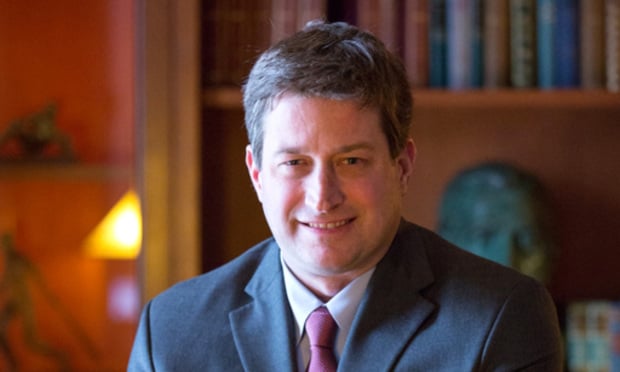Amy Wax Controversy Drags Penn Law Into Free-Speech Dilemma
Few people seem satisfied with Penn Law's latest response to the professor's comments, highlighting the fraught nature of free-speech issues for deans and other administrators who must balance competing pressures.
July 25, 2019 at 03:21 PM
6 minute read
The original version of this story was published on Law.com
 Penn Law Dean Ted Ruger. Courtesy photo.
Penn Law Dean Ted Ruger. Courtesy photo.
University of Pennsylvania Law School Dean Ted Ruger found himself in a familiar spot last week—caught between outraged students demanding sanctions against Amy Wax for what they view as her racist public comments and free-speech advocates who believe that the controversial professor has a right to air her views, however offensive.
Ruger had been in a similar position at least twice in the past two years when Wax published op-eds and gave interviews that were widely perceived as denigrating immigrants and black students at the law school.
 Amy Wax.
Amy Wax.The dean has taken a middle-of-the-road approach with Wax, and in the latest incident issued a statement condemning her comments as racist. He also said that they do not reflect the law school's position, but did not take formal action against her. Penn Law said Wax will be taking a previously planned sabbatical during the upcoming school year, however.
The recent controversy stems from Wax's statements that U.S. would be “better off with more whites and fewer nonwhites,” during a panel at a national conference for conservatives.
Ruger's latest response seems to have satisfied few people on either side of the matter. A consortium of Penn Law affinity groups and student organizations Tuesday issued a statement saying that the law school will continue “perpetuating white supremacy” as long as Wax remains on the faculty. (They had earlier circulated a petition calling for Wax to be removed from teaching.)
Meanwhile, some legal academics and free-speech advocates have rebuked Ruger for what they see as overstepping. Those critics argue that it's not the place of a dean or a law school to weigh in on the content of a professor's speech.
Penn Law has thus emerged as the latest battleground in the intensifying debate over campus free speech and how administrators should balance the feelings of students with the rights of academics to share their views without fear of reprisal. The law school's response is now being dissected on legal blogs and in the media, and the reactions run that gamut. (Ruger declined to further comment on the matter Thursday, while Wax did not immediately respond to requests for comment.)
Josh Blackman, a professor at South Texas College of Law Houston and a conservative who has also been protested by students for his views, said in an interview Thursday that Ruger went too far, while also acknowledging that the dean was under immense pressure to respond to hundreds of students and alumni who are fed up with Wax's repeated perceived transgressions.
“I think professors at Penn should use their own speech to criticize what [Wax] said,” Blackman said. “I think the dean has to remain neutral. It's so tempting for a dean to cave to pressure here. But if he does it here, I think it sets a bad precedent. The dean's job is to defend the institution and not go after individual faculty members.”
Along those lines, University of Chicago law professor Brian Leiter said Ruger had properly handled the previous Wax controversies, but botched his response to the latest storm.
“It is not the job of a dean to condemn the protected and lawful speech of faculty members,” Leiter wrote in a post in his blog, Brian Leiter's Law School Reports. “The public response should have been succinct and consisted only of this: 'Professor Wax speaks for herself, not for the institution.' Individual faculty are free to exercise their speech rights to criticize Wax's latest stupidity, but the institution, for whom the dean speaks, should remain silent.”
George Washington University law professor John Banzhaf took a slightly different view in his critique of Penn Law's response to the latest Wax controversy. Rather than simply labeling her comments as racist, the law school and her critics should have refuted her conclusions about immigration policy with a reasoned analysis, he wrote.
“If Penn disagrees with a professor, they should prove her wrong, not simply label what she said as 'racist,' and assume that should end all argument and provide the basis for punishment,” Banzhaf wrote.
Least satisfied at the law school's response were the student groups that initially asked it to pull Wax from the classroom. They said Ruger hadn't addressed their specific demands, which included hiring more minority tenured professors and mandating diversity and bias training. They also took issue with the way Ruger characterized Wax's comments, particularly this sentence in his prepared response: “At best, the reported remarks espouse a bigoted theory of white cultural and ethnic supremacy; at worst, they are racist.”
“Dean Ruger seems to believe that there is a difference between espousing 'a bigoted theory of white cultural and ethnic supremacy' and racism,” reads the statement from the student groups. “He is mistaken—there is no difference.”
But Erwin Chemerinsky, dean of the University of California, Berkeley School of Law and author of a recent book on campus free speech, said that deans have a responsibility to publicly disown racist speech while also resisting pressure to punish the professors responsible for that offensive speech, which is essentially the balance Ruger struck this week. Wax should not be fired for her comments, he added, but others should exercise their free speech rights to reject her conclusions.
“If I had a professor who said things that I believed were racist, I believe I have the obligation as a dean to condemn those statements as racist and to speak out,” Chemerinsky said. “I would say, 'The professor has a First Amendment right to say it and I also have a First Amendment right to express my opinion about it and speak for the institution.'”
This content has been archived. It is available through our partners, LexisNexis® and Bloomberg Law.
To view this content, please continue to their sites.
Not a Lexis Subscriber?
Subscribe Now
Not a Bloomberg Law Subscriber?
Subscribe Now
NOT FOR REPRINT
© 2025 ALM Global, LLC, All Rights Reserved. Request academic re-use from www.copyright.com. All other uses, submit a request to [email protected]. For more information visit Asset & Logo Licensing.
You Might Like
View All
4th Circuit Revives Racial Harassment Lawsuit Against North Carolina School District
3 minute read
'A Horrible Reputation for Bad Verdicts': Plaintiffs Attorney Breaks Down $129M Wrongful-Death Verdict From Conservative Venue

Trump’s DOE Pick Could Spell Trouble for Title IX Enforcement, Higher Ed Funding
4 minute read
'Substantive Deficiencies': Judge Grants Big Law Motion Dismissing Ivy League Price-Fixing Claims
3 minute readTrending Stories
- 1Supreme Court Takes Up Challenge to ACA Task Force
- 2'Tragedy of Unspeakable Proportions:' Could Edison, DWP, Face Lawsuits Over LA Wildfires?
- 3Meta Pulls Plug on DEI Programs
- 4On the Move and After Hours: Meyner and Landis; Cooper Levenson; Ogletree Deakins; Saiber
- 5State Budget Proposal Includes More Money for Courts—for Now
Who Got The Work
Michael G. Bongiorno, Andrew Scott Dulberg and Elizabeth E. Driscoll from Wilmer Cutler Pickering Hale and Dorr have stepped in to represent Symbotic Inc., an A.I.-enabled technology platform that focuses on increasing supply chain efficiency, and other defendants in a pending shareholder derivative lawsuit. The case, filed Oct. 2 in Massachusetts District Court by the Brown Law Firm on behalf of Stephen Austen, accuses certain officers and directors of misleading investors in regard to Symbotic's potential for margin growth by failing to disclose that the company was not equipped to timely deploy its systems or manage expenses through project delays. The case, assigned to U.S. District Judge Nathaniel M. Gorton, is 1:24-cv-12522, Austen v. Cohen et al.
Who Got The Work
Edmund Polubinski and Marie Killmond of Davis Polk & Wardwell have entered appearances for data platform software development company MongoDB and other defendants in a pending shareholder derivative lawsuit. The action, filed Oct. 7 in New York Southern District Court by the Brown Law Firm, accuses the company's directors and/or officers of falsely expressing confidence in the company’s restructuring of its sales incentive plan and downplaying the severity of decreases in its upfront commitments. The case is 1:24-cv-07594, Roy v. Ittycheria et al.
Who Got The Work
Amy O. Bruchs and Kurt F. Ellison of Michael Best & Friedrich have entered appearances for Epic Systems Corp. in a pending employment discrimination lawsuit. The suit was filed Sept. 7 in Wisconsin Western District Court by Levine Eisberner LLC and Siri & Glimstad on behalf of a project manager who claims that he was wrongfully terminated after applying for a religious exemption to the defendant's COVID-19 vaccine mandate. The case, assigned to U.S. Magistrate Judge Anita Marie Boor, is 3:24-cv-00630, Secker, Nathan v. Epic Systems Corporation.
Who Got The Work
David X. Sullivan, Thomas J. Finn and Gregory A. Hall from McCarter & English have entered appearances for Sunrun Installation Services in a pending civil rights lawsuit. The complaint was filed Sept. 4 in Connecticut District Court by attorney Robert M. Berke on behalf of former employee George Edward Steins, who was arrested and charged with employing an unregistered home improvement salesperson. The complaint alleges that had Sunrun informed the Connecticut Department of Consumer Protection that the plaintiff's employment had ended in 2017 and that he no longer held Sunrun's home improvement contractor license, he would not have been hit with charges, which were dismissed in May 2024. The case, assigned to U.S. District Judge Jeffrey A. Meyer, is 3:24-cv-01423, Steins v. Sunrun, Inc. et al.
Who Got The Work
Greenberg Traurig shareholder Joshua L. Raskin has entered an appearance for boohoo.com UK Ltd. in a pending patent infringement lawsuit. The suit, filed Sept. 3 in Texas Eastern District Court by Rozier Hardt McDonough on behalf of Alto Dynamics, asserts five patents related to an online shopping platform. The case, assigned to U.S. District Judge Rodney Gilstrap, is 2:24-cv-00719, Alto Dynamics, LLC v. boohoo.com UK Limited.
Featured Firms
Law Offices of Gary Martin Hays & Associates, P.C.
(470) 294-1674
Law Offices of Mark E. Salomone
(857) 444-6468
Smith & Hassler
(713) 739-1250










